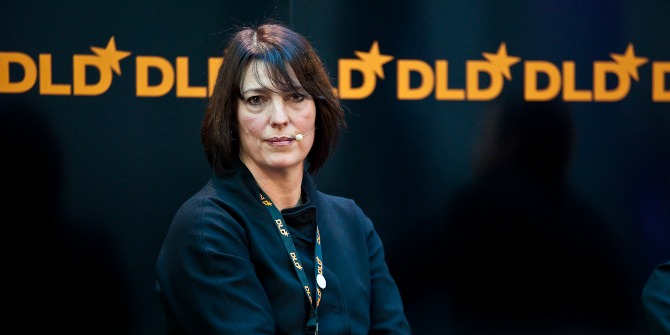A class pay gap prevents those who are upwardly mobile from accruing the very highest earnings in Britain’s higher professional and managerial occupations. Sam Friedman studied the UK television industry and found a serious lack of socio-economic diversity, prompting policy reform by Channel 4 and others.
| Impact Case -- Research Excellence Framework (REF) |
|---|
There is growing interest among policymakers in the effects of class or socio-economic background on access to employment opportunities in the UK. However, until recently there has been a lack of data on employees’ backgrounds, and how class origin affects access, pay and progression within different industries and employment sectors.
The UK’s creative cultural industries are a large – and prestigious – professional sector. In 2019, almost 120,000 people worked in film and video production in the UK alone. While there is a popular narrative that creative industries are open and meritocratic, in reality they have often been dominated at the higher levels by those from privileged backgrounds, though the extent of this problem was, until recently, unquantified.
What did we do?
My co-author Daniel Laurison (Swarthmore College, Pennsylvania) and I were the first academics to elucidate a “class pay gap” preventing those who are upwardly mobile from accruing the very highest earnings in Britain’s higher professional and managerial occupations. Even when people from working-class backgrounds enter elite occupations, they earn an average of 16 per cent (or £7,350 per year) less than those from privileged backgrounds. Significantly, this pay gap persists even when educational attainment and other demographic and employment measures are accounted for.
In follow-up research, my colleagues and I (led by Professor Dave O’Brien, University of Sheffield) used new social origin data from the 2014 UK Labour Force Survey to provide the first large-scale, representative study of the class composition of Britain’s creative workforce. It found a significant under-representation of those with working-class origins and a class pay gap across the sector – with publishing and music particularly socially exclusive.
I extended this work by investigating the drivers of the class pay gap in Britain’s elite occupations. This was achieved via four in-depth occupational case studies, spanning accountancy, broadcasting, architecture, and acting, analysed in my 2019 book with Daniel Laurison, The Class Ceiling: Why it Pays to be Privileged.
The broadcasting case study took place at Channel 4 and was published as a report for the channel in December 2017. A questionnaire circulated to all 828 staff members (response rate 76 per cent) revealed that 67 per cent of respondents came from professional or managerial backgrounds and only nine per cent from working-class backgrounds. The research also suggested that a powerful “class ceiling” inhibits progression. This is most acute within the organisation’s commissioning arm (79 per cent from professional or managerial backgrounds) and within senior management, where 87 per cent are from professional or managerial backgrounds, while only 2.5 per cent come from working-class backgrounds.
Meritocratic differences in education, skills, and experience did not fully explain this ceiling effect. Fifty in-depth interviews with Channel 4 staff revealed that those from low socio-economic backgrounds face a set of distinct economic, social, and cultural barriers to progression. First, the upwardly mobile often decide not to follow the creative pathway because of the economic risk and uncertainty involved. Second, there is a widespread culture of sponsorship in television. These sponsor relationships often emerge informally based on a cultural similarity rooted in shared social class background. Finally, an exclusive highbrow culture prevails in commissioning. In particular, the ability to employ a highbrow style or reference high-art forms in creative discussions is highly prized – even if it is unnecessary for effective TV programme-making. Those from low socio-economic backgrounds find this cultural norm alienating and intimidating, but one with which they must assimilate to succeed.
What happened?
My report found that Channel 4, despite its explicit ambition to be a pioneer of social diversity, is highly socially exclusive. Channel 4 accepted the report’s findings and undertook many of its practical recommendations. It created a Channel 4 Social Mobility Taskforce (I became a member) and it uses the research methodology to continue to monitor social mobility among staff and applicants.
The channel has implemented several measures to address the barriers identified, including banning family and friends work placements. The new 4Talent outreach programme offers skills tuition for up to 1,000 young people each year in areas of social deprivation, and they have introduced an apprenticeship scheme aimed at applicants from low socio-economic backgrounds who do not hold a degree, as well as financial relocation assistance. To address the problems of informal sponsorship, Channel 4 set up a formalised commissioner mentoring network, targeted at underrepresented groups.
These changes have already delivered improvements, with the proportion of staff who are socially mobile increasing from 33 per cent in 2016 to 39 per cent in 2020.
Alongside internal reforms, the report recommended that Channel 4 take a public leadership position to start an industry-wide conversation about social mobility. In August 2018, Channel 4 published the research, circulating it widely through the national media. It also committed to encouraging independent production companies and other suppliers to follow suit in improving social mobility. In evidence provided to the House of Commons Digital, Culture, Media and Sport Committee, Channel 4 Chief Executive Alex Mahon cited the research as a catalyst for this commitment to promoting industry-wide change.
In 2018, Channel 4, the BBC, ITV, Channel 5, and PACT (which represents TV independents) provided me with data for follow-up industry-wide research, which showed how the whole sector is skewed heavily towards the privileged – although Channel 4 was still by far the most exclusive. In 2019, industry regulator Ofcom’s annual report on diversity in television included, for the first time, analysis of the socio-economic backgrounds of the industry workforce, and the BBC, ITV, Viacom, and Channel 4 have agreed to develop a pan-industry approach to improving social mobility.
Beyond the creative industries, the work has catalysed a wider policy discussion on social mobility. I have provided evidence to policymakers and institutions, including within Parliament and for the Social Mobility Commission, where I served as a Commissioner from 2018 to 2021. I was also invited to Number 10 to discuss how his research could inform government policy, and this work has influenced policy work by the Labour Party, and the Trades Union Congress (TUC). I also recently spoke at the European Assembly, who subsequently passed a resolution relating to discrimination based on social origin.
There has also been extensive media coverage of the research, culminating in a BBC2 documentary “How to Break into the Elite”, in which I was featured. This considerable media profile has opened up a lively public debate about how class origin shapes elite careers in Britain, and the term “class ceiling” is now routinely used in the media and within everyday life.
LSE Festival short on Sam Friedman’s work:
LSE short on Sam Friedman’s paper From Aristocratic to Ordinary: shifting modes of elite distinction:
♣♣♣
Notes:
- This blog post appeared originally as an LSE Research Excellence Framework (REF) impact case study.
- The post represents the views of its author(s), not the position of LSE Business Review or the London School of Economics.
- Featured image by Matt Brown, under a CC-BY-2.0 licence
- When you leave a comment, you’re agreeing to our Comment Policy





